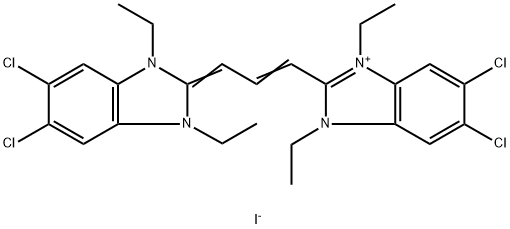JC-1
Synonym(s):5,5ʹ,6,6ʹ-Tetrachloro-1,1ʹ,3,3ʹ-tetraethylbenzimidazolylcarbocyanine Iodide;JC-1 - CAS 47729-63-5 - Calbiochem
- CAS NO.:47729-63-5
- Empirical Formula: C25H27Cl4IN4
- Molecular Weight: 652.22
- MDL number: MFCD00188475
- SAFETY DATA SHEET (SDS)
- Update Date: 2024-03-29 18:52:01

What is JC-1?
The Uses of JC-1
JC-1 is commonly used to determine mitochondrial membrane potential. It is a cationic carbocyanine dye that is membrane permeable and is often used for flow cytometry and fluorescent microscopy. This dye changes color as the membrane potential increases. At higher potentials, JC-1 forms aggregates, which changes the fluorescence emission color from green to red. Dyes and metabolites.
Definition
ChEBI: 1,1',3,3'-tetraethyl-5,5',6,6'-tetrachloroimidacarbocyanine iodide is a cyanine dye and an organic iodide salt. It has a role as a fluorochrome. It contains a 1,1',3,3'-tetraethyl-5,5',6,6'-tetrachloroimidacarbocyanine.
General Description
A cationic, fluorescent, carbocyanine dye that can be used as a ratiometric indicator of mitochondrial potential ΔΨm in cells, tissues, and isolated mitochondria. It labels mitochondria with high membrane potential orange and mitochondria with low membrane potential green. Mitochondrial depolarization is indicated by a decrease in the red/green fluorescence intensity ratio. Ideal for detection of collapse of ΔΨm induced by uncouplers of mitochondrial respiration. The potential-sensitive color shift is due to concentration-dependent formation of red fluorescent J-aggregates. JC-1 has also been used in a functional assay of multidrug-resistance cells and in apoptosis-related mitochondrial modifications.
Biochem/physiol Actions
Product does not compete with ATP.
storage
-20°C
Properties of JC-1
| storage temp. | -20C |
| form | solid |
Safety information for JC-1
| Signal word | Warning |
| Pictogram(s) |
 Exclamation Mark Irritant GHS07 |
| GHS Hazard Statements |
H302:Acute toxicity,oral H315:Skin corrosion/irritation H319:Serious eye damage/eye irritation H335:Specific target organ toxicity, single exposure;Respiratory tract irritation |
| Precautionary Statement Codes |
P261:Avoid breathing dust/fume/gas/mist/vapours/spray. P305+P351+P338:IF IN EYES: Rinse cautiously with water for several minutes. Remove contact lenses, if present and easy to do. Continuerinsing. |
Computed Descriptors for JC-1
New Products
(S)-3-Aminobutanenitrile hydrochloride 4-Methylphenylacetic acid N-Boc-D-alaninol N-BOC-D/L-ALANINOL Tert-butyl bis(2-chloroethyl)carbamate 3-Morpholino-1-(4-nitrophenyl)-5,6-dihydropyridin- 2(1H)-one Furan-2,5-Dicarboxylic Acid Tropic acid 1-Bromo-3,5-Di-Tert-Butylbenzene S-2-CHLORO PROPIONIC ACID ETHYL ISOCYANOACETATE 2-Bromo-1,3-Bis(Dimethylamino)Trimethinium Hexafluorophosphate 4-IODO BENZOIC ACID 3-NITRO-2-METHYL ANILINE 1-(2,4-DICHLOROPHENYL) ETHANAMINE (2-Hydroxyphenyl)acetonitrile 4-Bromopyrazole 2-(Cyanocyclohexyl)acetic acid 4-methoxy-3,5-dinitropyridine 1-(4-(aminomethyl)benzyl)urea hydrochloride 2-aminopropyl benzoate hydrochloride diethyl 2-(2-((tertbutoxycarbonyl)amino) ethyl)malonate tert-butyl 4- (ureidomethyl)benzylcarbamate Ethyl-2-chloro((4-methoxyphenyl)hydrazono)acetateRelated products of tetrahydrofuran








You may like
-
 JC-1 CAS 47729-63-5View Details
JC-1 CAS 47729-63-5View Details
47729-63-5 -
 2033-24-1 98%View Details
2033-24-1 98%View Details
2033-24-1 -
 1975-50-4 98%View Details
1975-50-4 98%View Details
1975-50-4 -
 2-HYDROXY BENZYL ALCOHOL 98%View Details
2-HYDROXY BENZYL ALCOHOL 98%View Details
90-01-7 -
 2-Chloro-1,3-Bis(Dimethylamino)Trimethinium Hexafluorophosphate 221615-75-4 98%View Details
2-Chloro-1,3-Bis(Dimethylamino)Trimethinium Hexafluorophosphate 221615-75-4 98%View Details
221615-75-4 -
 61397-56-6 CIS BROMO BENZOATE 98%View Details
61397-56-6 CIS BROMO BENZOATE 98%View Details
61397-56-6 -
 14714-50-2 (2-Hydroxyphenyl)acetonitrile 98+View Details
14714-50-2 (2-Hydroxyphenyl)acetonitrile 98+View Details
14714-50-2 -
 118753-70-1 98+View Details
118753-70-1 98+View Details
118753-70-1